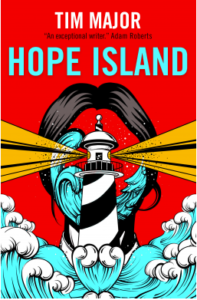This page-turner of a slow burn horror novel features one of the most original — and in hindsight, one of the most ubiquitous, after a fashion — villains I’ve ever read. I spent far too much time wrongly guessing what lay behind the bizarre behaviors of the residents of Hope Island, and was dead impressed at the reveal.
 The story itself revolves around Nina Scaife, a workaholic television producer whose partner Rob has just walked out on her. Determined to prove to their teenaged daughter Laurie that they’re still a family, she takes Laurie to visit Rob’s parents on Hope Island, off the coast of Maine. Rob and Laurie have made the trip plenty of times over the years but Nina has always begged off, claiming work commitments. Now, however, Nina finds that her somewhat rash idea of visiting people she barely knows with a daughter she still needs to break the news of the split to is perhaps even more ill-conceived than she’d expected.
The story itself revolves around Nina Scaife, a workaholic television producer whose partner Rob has just walked out on her. Determined to prove to their teenaged daughter Laurie that they’re still a family, she takes Laurie to visit Rob’s parents on Hope Island, off the coast of Maine. Rob and Laurie have made the trip plenty of times over the years but Nina has always begged off, claiming work commitments. Now, however, Nina finds that her somewhat rash idea of visiting people she barely knows with a daughter she still needs to break the news of the split to is perhaps even more ill-conceived than she’d expected.
Because Hope Island is strange. At first, Nina puts it down to a sense of culture shock, coming from metropolitan Britain to rural America and having to live with her husband’s seemingly disapproving family. But then she realizes that her dour mother-in-law Tammy’s idea of religion is a nearby artist’s colony called The Sanctuary, and that something is really odd about the island children who keep drawing Laurie into their midst, and soon Nina’s interior turmoil is matched by a vertiginous sense of wrongness. And that’s even before the murders start.
In addition to the revelation of the Big Bad, I was really taken with the way Tim Major wrote of Nina’s often physical losses of perspective, so reminiscent of a Christoper Nolan movie that I almost expected to hear the foghorn blare of one of Mr Nolan’s beloved Shepard tones as I read. The passages charting Nina’s disorientation are a terrific metaphor for the changes besetting a woman who has to learn how to family after her partner, who also happened to be their daughter’s primary caregiver, takes off on them. I’m also a big fan of how the voices felt authentically Anglo or American, depending on which character was speaking — tho the fact that I even noticed this seamlessly carried out last should be no surprise to long-time readers here.
In a previous interview with Mr Major, I noted that much of his writing up till and including his prior novel Snakeskins had to do with themes of maturation. While those are still present in Hope Island, this novel feels more like an exploration of a different kind of growing up, with perhaps even a healthy acknowledgment of growing apart. It’s an excellent addition to his oeuvre, and just a really good, original horror novel.

3 comments
“… And then the murders began.”
Author
I mean, is it even really a horror novel if people aren’t gruesomely done in by malevolent forces?
Not in my book!